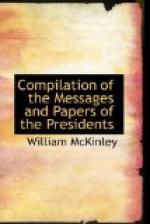WILLIAM McKINLEY.
SECOND ANNUAL MESSAGE.
EXECUTIVE MANSION, December 5, 1898.
To the Senate and House of Representatives:
Notwithstanding the added burdens rendered necessary by the war, our people rejoice in a very satisfactory and steadily increasing degree of prosperity, evidenced by the largest volume of business ever recorded. Manufacture has been productive, agricultural pursuits have yielded abundant returns, labor in all fields of industry is better rewarded, revenue legislation passed by the present Congress has increased the Treasury’s receipts to the amount estimated by its authors, the finances of the Government have been successfully administered and its credit advanced to the first rank, while its currency has been maintained at the world’s highest standard. Military service under a common flag and for a righteous cause has strengthened the national spirit and served to cement more closely than ever the fraternal bonds between every section of the country.
A review of the relation of the United States to other powers, always appropriate, is this year of primary importance in view of the momentous issues which have arisen, demanding in one instance the ultimate determination by arms and involving far-reaching consequences which will require the earnest attention of the Congress.
In my last annual message[12] very full consideration was given to the question of the duty of the Government of the United States toward Spain and the Cuban insurrection as being by far the most important problem with which we were then called upon to deal. The considerations then advanced and the exposition of the views therein expressed disclosed my sense of the extreme gravity of the situation. Setting aside as logically unfounded or practically inadmissible the recognition of the Cuban insurgents as belligerents, the recognition of the independence of Cuba, neutral intervention to end the war by imposing a rational compromise between the contestants, intervention in favor of one or the other party, and forcible annexation of the island, I concluded it was honestly due to our friendly relations with Spain that she should be given a reasonable chance to realize her expectations of reform to which she had become irrevocably committed. Within a few weeks previously she had announced comprehensive plans which it was confidently asserted would be efficacious to remedy the evils so deeply affecting our own country, so injurious to the true interests of the mother country as well as to those of Cuba, and so repugnant to the universal sentiment of humanity.




